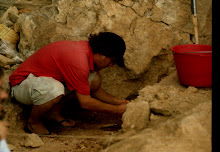One of the nice things about being at McGill is the generally high caliber of our undergrads and the sheer enthusiasm of many of those interested in archaeology. This is shown, among other things, by the rather sophisticated papers some of them will write for certain classes.
One of the archaeology courses taught in the Dept. of Anthropology is "Archaeological Methods" (ANTH 357). This semester, the course was taught by my colleague Stephen Chrisomalis, who involved the students in an interesting spin on archaeological classification. In lieu of employing actual or replicated artifacts to familiarize them with this facet of archaeological practice, the students selected, handled and studied a few hundred examples items that are part and parcel of daily material culture in Montreal: dollar store coffee mugs (aka "dollarware"). While surprising at first glance, this choice of material culture is actually quite appropriate for several reasons. One of those is that is drives home the point that, during their use-life, artifacts were part of a living system of technological use. Another reason is that dollarware often combine multiple dimensions of analysis that archaeologists care about beyond the physical characteristics of an object, including style, iconography, composition and even writing systems.
Well, the "dollarware phase" of ANTH 357 is done for the semester and there is now a cool little web site put up by Stephen that contains all of the reports on the "collecion" produced by the students. It's really neat to see the various angles taken by different students in their studies! Go check it out and check out the papers to see how contemporary dollarware can be a good proxy through which to understand archaeological classification.
An Artificially Intelligent Pseudoarchaeologist?
7 months ago

2 comments:
Hey, thanks for the link! Don't know why I didn't see it earlier. Oh right ... insane amounts of end-of-term work ...
insane amounts of end-of-term work?! what ever do you speak of, kind sir?
Post a Comment